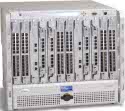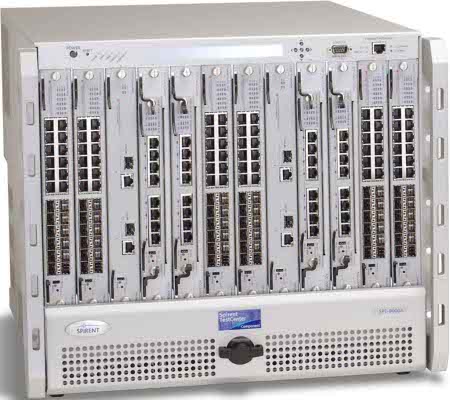720 Linux databases squeeze onto test system
Jun 29, 2009 — by Eric Brown — from the LinuxDevices Archive — 9 views Spirent Communications is shipping its Linux-based TestCenter testing system with McObject's ExtremeDB embedded database, says the company. The latest version of TestCenter can run up to 720 ports on a single rack, each with its own processor, Linux OS, and eXtremeDB in-memory database, says McObject.
Spirent Communications is shipping its Linux-based TestCenter testing system with McObject's ExtremeDB embedded database, says the company. The latest version of TestCenter can run up to 720 ports on a single rack, each with its own processor, Linux OS, and eXtremeDB in-memory database, says McObject.
The scalability of of DBMS deployments on the TestCenter device is unprecedented, says McObject, which in December released version 4.0 of its Linux-ready, in-memory ExtremeDB database management system (DBMS). Scaling to over 700 instances, the system positions ExtremeDB at each of the device's ports to emulate network traffic flows, says McObject. Each port can generate packet traffic equivalent to using 32,000 routers, servers, gateways, or other networking devices in a real-world network, says the company.
The new TestCenter design captures, stores, and analyzes incoming network data locally on each distributed ExtremeDB instance. It then transfers the results to a main ExtremeDB deployment embedded in the control system software on the tester's PC, says McObject. This distributed approach is said to minimize messaging traffic, resulting in more efficient processing.

Spirent TestCenter
(Click to enlarge)
ExtremeDB maintains a code footprint as small as 50KB, enabling it to run in memory for most embedded and real-time applications, thereby improving performance compared to disk-based operation, says McObject. The Linux-compatible software is said to support transactions, concurrent access, and a high-level data definition language. McObject also offers a high-availability version that supports local or distributed replication, with automatic fail-over. Last year, it shipped an ExtremeDB version that runs in kernel mode.
ExtremeDB 4.0 is said to offer improved multi-user performance. It also adds a second native application programming interface (API), as well as support for the KD-Tree database index, used for pattern matching. In addition, the company offers an open source "Perst" object-oriented DBMS (OODBMS) for Java objects, that supports the mobile Linux Android distribution.
Spirent TestCenter
The Spirent TestCenter system is built on a multi-user, multi-system client/server architecture that can help testing teams shift from a locally fixed system to a globally shared collaboration test system, says Spirent. The system is said to provide a unified Layer 2-7, object-oriented architecture that can support seamless integration of new network protocols and multi-play services.
Offering a claimed 4.8 Terabits per rack using 10-gigabit Ethernet modules, the system also supports single gigabit Ethernet, and is future compatible to 40- and 100GbE networking boards, claims the company. Touted for its low power consumption, the system ships with an open API, available in Tcl, C, and Perl, supporting run-times on Linux, Windows, and Solaris.
Spirent Communications' testing products are said to be used by more than 1,700 customers in 30 countries.
Stated Tom McBeath, CTO, Spirent Communications, "The ability to capture the widest possible range of useful data is central to Spirent TestCenter's Intelligent Results capability for quick fault identification, isolation and analysis. eXtremeDB helps us to deliver meaningful results rather than just raw numbers. It was more than twice as fast as the second place database."
Availability
More information on Spirent TestCenter may be found here. More information on ExtremeDB should be here.
This article was originally published on LinuxDevices.com and has been donated to the open source community by QuinStreet Inc. Please visit LinuxToday.com for up-to-date news and articles about Linux and open source.